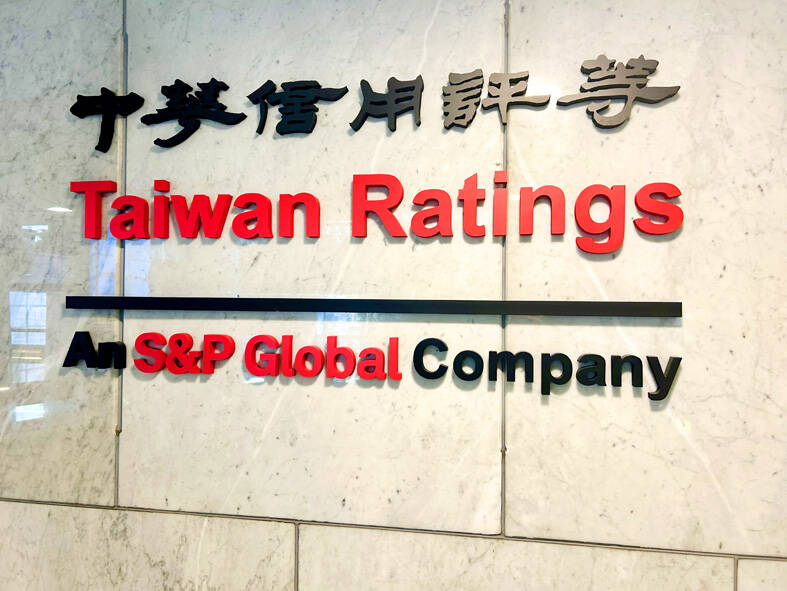Taiwan Ratings Corp (中華信評) has raised its forecast for Taiwan’s economic growth next year from 2.1 percent to 2.4 percent, as strong demand for artificial intelligence (AI) products would provide a solid buffer against potential challenges.
“Strong and rising demand for AI-related devices will continue to propel Taiwan’s economy over the next year,” Taiwan Ratings corporate credit analyst Raymond Hsu (許智清) told a media briefing in Taipei yesterday.
Similar reasons also prompted the agency to increase its growth projection for this year from 4.2 percent to 4.4 percent.

Photo: Wu Hsin-tien, Taipei Times
Hsu said the revisions assume a scenario where US president-elect Donald Trump would not impose additional tariffs on Taiwanese goods after he takes office next month.
Trump has pledged to tighten tariffs on goods from Canada, Mexico and China, and he earlier said Taiwan should pay higher tariffs for stealing the US’ chip business.
The specter of unfavorable trading terms, as well as lingering geopolitical tensions and restrictive interest rates, would constrain economies with heavy dependence on exports such as Taiwan, Hong Kong, Singapore and South Korea, Taiwan Ratings said.
Local tech firms on the AI supply chain would fare better as they command leadership positions in technology processes, Hsu said.
Global technology giants have indicated plans to step up budgets in AI development and investment, a positive trend that would help offset an expected economic slowdown in China, the largest destination for Taiwanese exports, Taiwan Ratings said.
China’s consumer confidence remains slack, despite stimulus measures and Washington’s extra tariffs, if true, would attenuate its effort to come out of the woods, Hsu said.
The ratings agency is looking at tariff hikes from 19.3 percent currently to 25 percent after Trump’s inauguration, limiting China’s GDP growth to 4.1 percent next year, from 4.8 percent this year, he said.
Not all Taiwanese tech firms would evenly benefit from the AI fever. Demand for electronics used in AI equipment and cloud computing is strong, but that for consumer electronics and vehicles would underperform, due to a lack of breakthrough applications and sharpening competition, Hsu said.
As for non-tech sectors, the landscape appears dim going forward, Taiwan Ratings said.
Local makers of cement, base metal and mass commodity products would likely have to grapple with a persistent capacity glut and price cuts, with the Chinese market weighed down by trade disputes with the US, Hsu said.

Taiwan will prioritize the development of silicon photonics by taking advantage of its strength in the semiconductor industry to build another shield to protect the local economy, National Development Council (NDC) Minister Paul Liu (劉鏡清) said yesterday. Speaking at a meeting of the legislature’s Economics Committee, Liu said Taiwan already has the artificial intelligence (AI) industry as a shield, after the semiconductor industry, to safeguard the country, and is looking at new unique fields to build more economic shields. While Taiwan will further strengthen its existing shields, over the longer term, the country is determined to focus on such potential segments as

UNCERTAINTY: Innolux activated a stringent supply chain management mechanism, as it did during the COVID-19 pandemic, to ensure optimal inventory levels for customers Flat-panel display makers AUO Corp (友達) and Innolux Corp (群創) yesterday said that about 12 to 20 percent of their display business is at risk of potential US tariffs and that they would relocate production or shipment destinations to mitigate the levies’ effects. US tariffs would have a direct impact of US$200 million on AUO’s revenue, company chairman Paul Peng (彭雙浪) told reporters on the sidelines of the Touch Taiwan trade show in Taipei yesterday. That would make up about 12 percent of the company’s overall revenue. To cope with the tariff uncertainty, AUO plans to allocate its production to manufacturing facilities in

COLLABORATION: Given Taiwan’s key position in global supply chains, the US firm is discussing strategies with local partners and clients to deal with global uncertainties Advanced Micro Devices Inc (AMD) yesterday said it is meeting with local ecosystem partners, including Taiwan Semiconductor Manufacturing Co (TSMC, 台積電), to discuss strategies, including long-term manufacturing, to navigate uncertainties such as US tariffs, as Taiwan occupies an important position in global supply chains. AMD chief executive officer Lisa Su (蘇姿丰) told reporters that Taiwan is an important part of the chip designer’s ecosystem and she is discussing with partners and customers in Taiwan to forge strong collaborations on different areas during this critical period. AMD has just become the first artificial-intelligence (AI) server chip customer of TSMC to utilize its advanced

Chizuko Kimura has become the first female sushi chef in the world to win a Michelin star, fulfilling a promise she made to her dying husband to continue his legacy. The 54-year-old Japanese chef regained the Michelin star her late husband, Shunei Kimura, won three years ago for their Sushi Shunei restaurant in Paris. For Shunei Kimura, the star was a dream come true. However, the joy was short-lived. He died from cancer just three months later in June 2022. He was 65. The following year, the restaurant in the heart of Montmartre lost its star rating. Chizuko Kimura insisted that the new star is still down